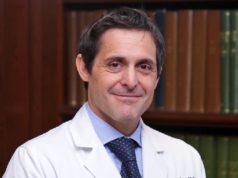
Patients discharged three days after open heart surgery are not at increased risk of complications, an analysis of discharge patterns has shown. S Chris Malaisrie (Northwestern Medicine, Chicago, USA) unveiled the findings at the 56th Annual Meeting of the Society of Thoracic Surgeons (STS 2020; 25–28 January, New Orleans, USA).
Malaisrie said: “We have shown that long hospital stays after heart surgery are no longer necessary, and patients can go home safely after just a few days in the hospital. This information helps pave the way for the introduction of a cardiac enhanced recovery after surgery (ERAS) programme, proving that the use of such a strategy is feasible.”
In a press conference preceding the main presentation, he explained the rationale: “Shorter length of stay is a welcome consequence but not the goal of ERAS, which leads to improved overall patient recovery. However we are concerned about potential unintended consequences as a result of sending patients home in an accelerated fashion. Our objective was to look at patients who were discharged after elective cardiac surgery in three days or less … and make sure that nothing adverse happened to them in terms of complications and readmissions to the hospital..”
The researchers examined data from 478 patients who underwent nonemergency coronary artery bypass grafting (CABG) surgery or valve surgery (that is, patients had both mitral and aortic surgery) between July 2004 and June 2017 at Northwestern Memorial Hospital. The patients were separated into two groups: 357 patients with a length of stay (LOS) >three days and 121 patients with a LOS <three days. The median length of stay in the overall population of 5,987 subjects was six days.
Baseline demographics of the two cohorts after propensity score matching were similar for age (mean 51 years), sex (15% females in the group with length of stay >three days vs. 18% with length of stay <three days, p=0.47), and STS risk score (0.4, 95% confidence interval [CI] 0.3–0.9 for both cohorts, p=0.89). “These are younger patients, mostly male, and are very low risk,” said Malaisrie. “Operations that encompassed this group were mostly mitral valve surgery/mitral valve repair (41% in LOS>three days vs. 31% LOS <three days, p=0.07), isolated CABG [12% In both groups], and also aortic valve replacements.”
Aside from postoperative atrial fibrillation rates (2% in the ≤three day LOS group and 19% in the >three day LOS group, p<0.001), rates of other complications, 30-day readmissions, and mortality rates were comparable. mortality was 0% in both groups:
“No one died as a result of accelerated discharge,” said Malaisrie, adding: “Even though patients were discharged in an accelerated fashion, these patients were not coming back to the hospital for readmission. Both groups were very similar; only about 6–8% of patients were readmitted after they were discharged home.”
There were 26 cases of in-hospital major morbidity (such as, stroke, renal failure, reoperation for bleeding), all of which occurred in the LOS >three days group (p=0.001). Long-term survival was very similar between the two groups.
“Patients can go home after a shorter length of stay in the hospital without increased risk of complications and rehospitalisations,” said Malaisrie. “Because we found no detrimental effect of accelerated discharge, both patients and physicians should not be averse to discharging patients when medically ready.”
ERAS is a multidisciplinary treatment programme designed to achieve quicker recovery for patients undergoing major surgery and offers sustainable improvement in the overall quality of care. As a result of their findings, Malaisrie et al are developing Northwestern’s first cardiac ERAS program, which will offer standardised approaches for optimising surgical outcomes. The programme will include a suite of evidence based care protocols based on the recently published guidelines from the ERAS Cardiac Society for optimal perioperative care in heart surgery.
Daniel Engelman (Baystate Health, Springfield USA), president of the non-profit ERAS Cardiac Society added, “Multiple interventions are required for the success of an ERAS program. There is no single magic bullet. Instead, it is through cumulative efforts that ERAS is successful for the patient. We would like to see the care of heart surgery patients be focused more on improving outcomes from the patient’s perspective and less from the physician’s.” He added: “The STS has been fully supportive of our efforts to standardize best practice in both preoperative optimisation and postoperative patient centered care pathways.”
Malaisrie anticipates that the Northwestern Medicine cardiac ERAS program will result in faster recoveries, reduced complications, decreased opioid utilisation and time in the hospital, lower costs, and improved patient/family satisfaction. In the future, the researchers plan to closely examine both traditional clinical endpoints and patient-reported outcomes from the programme.
“Expectations for recovery after cardiac surgery are being reset in the current era,” he said. “What does this mean for patients? It means that prolonged or taxing recovery is no longer required. Patients should know that recovery from heart surgery is not only quicker, but also better with ERAS programmes.”













